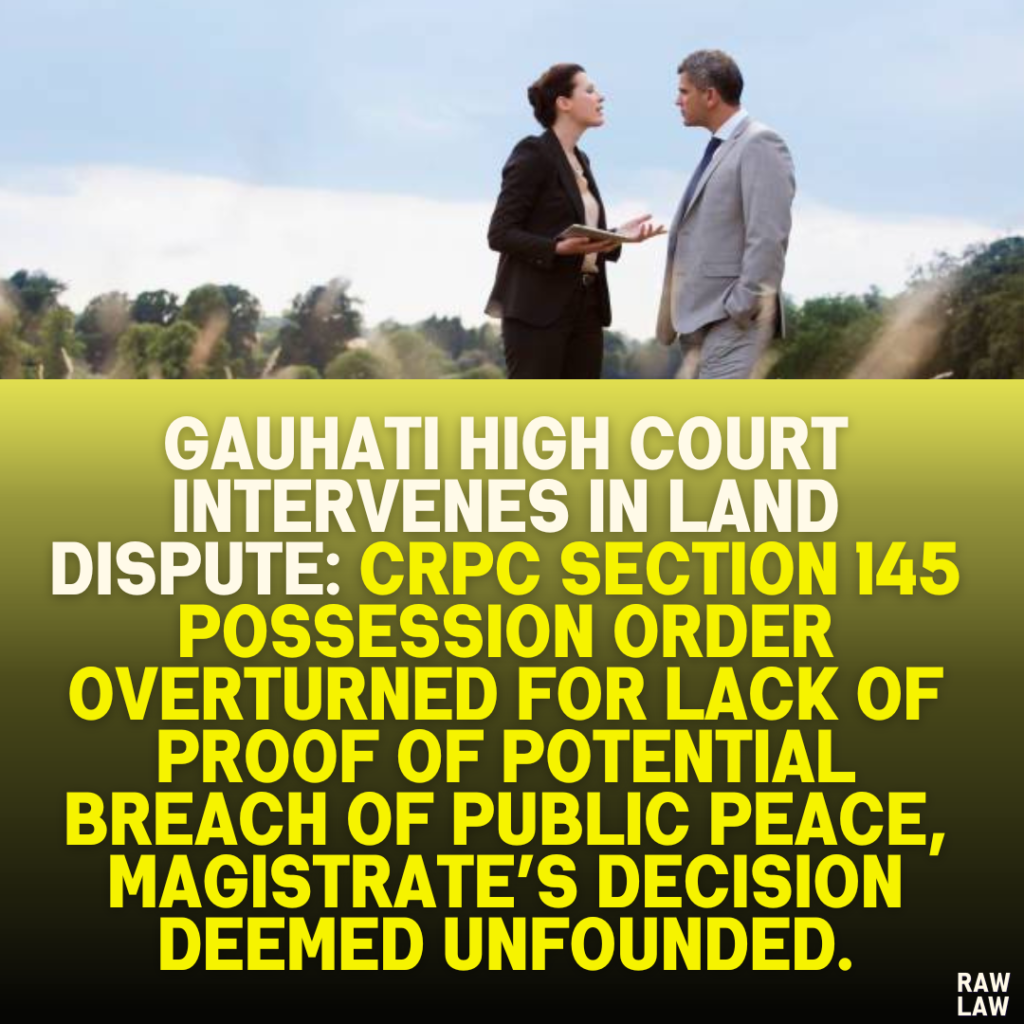Court’s Decision:
The Gauhati High Court dismissed the petition filed under Sections 397, 401, and 482 of the Criminal Procedure Code (Cr.PC) against the Executive Magistrate’s order. The Magistrate had declared possession of the disputed land in favor of the respondents under Section 145 of Cr.PC. The High Court held that the Magistrate’s order lacked the justification required under Section 145, as there was no indication of public peace or tranquility being at risk. Thus, the proceedings were deemed unwarranted, and the petition was dismissed.
Facts of the Case:
- The disputed land measured 5 Bighas 4 Kathas 4 Lechas under Touzi Patta No. 259, Dag Nos. 908 and 633, in Barkukuria village.
- The petitioner claimed possession of the land for over 20 years, asserting that he cultivated the land and paid land revenue.
- The petitioner alleged that the respondents, along with miscreants, forcefully entered the land, destroyed crops, and attempted to dispossess him.
- In response, the petitioner filed a case under Section 145/146 Cr.PC before the Executive Magistrate for attachment of the land and to restrain the respondents.
- The Magistrate declared possession in favor of the respondents, prompting the petitioner to file this revision petition.
Issues:
- Whether the Magistrate’s order declaring possession in favor of the respondents was justified under Section 145 Cr.PC.
- Whether the dispute involved sufficient risk of breach of public peace to invoke Section 145.
Petitioner’s Arguments:
- The petitioner asserted that he was the rightful possessor of the land and had cultivated it for over two decades, supported by evidence of revenue payments and official reports.
- He argued that the respondents had fraudulently claimed possession, and the Magistrate failed to properly evaluate the evidence in his favor.
- The petitioner emphasized that the respondents’ actions were illegal and intended to dispossess him.
Respondent’s Arguments:
- The respondents claimed continuous possession of the land since 1970, asserting that their father had purchased it and they had maintained its use as a farmhouse.
- They alleged that the petitioner, using his official influence as a government employee, attempted to grab the land by colluding with revenue officials.
- They argued that the Magistrate’s order was based on proper evidence and that the criminal revision petition was not maintainable as the order was interlocutory.
Analysis of the Law:
- Scope of Section 145 Cr.PC:
Section 145 deals with disputes likely to cause a breach of peace over possession of land. It empowers the Magistrate to declare possession in favor of a party without addressing ownership or title. The focus is solely on averting public disorder. - Magistrate’s Duty:
The Magistrate must be satisfied that the dispute threatens public tranquility before invoking Section 145. If no such threat exists, the Magistrate lacks jurisdiction to proceed under this provision. - Precedents Cited:
- Girish Kumar Suneja v. CBI (2017) 14 SCC 809: Limits on criminal revision petitions challenging interlocutory orders.
- Amit Kapoor v. Ramesh Chandar (2012) 9 SCC 460: Emphasis on preventing misuse of Section 145 for disputes without public peace concerns.
- Vhinka v. Chaman Singh (AIR 1959 SCC 960): Clarifies the preventive nature of Section 145.
Precedent Analysis:
The Court noted that the precedents reinforced the limited jurisdiction under Section 145, restricting its application to disputes with public peace implications. The focus must remain on the actual possession of the land at the time of the dispute without addressing ownership or other civil rights.
Court’s Reasoning:
- Magistrate’s Findings:
The Magistrate had declared possession in favor of the respondents based on evidence of their presence on the land two months before the dispute. However, the Magistrate failed to establish that the dispute involved any likelihood of public peace disturbance. - High Court’s Observation:
- The Court emphasized that Section 145 proceedings are preventive and provisional, aimed solely at maintaining peace.
- The Magistrate’s jurisdiction does not extend to resolving private disputes unless public tranquility is threatened.
- In this case, the evidence did not demonstrate any broader risk to public order, making the proceedings under Section 145 unwarranted.
Conclusion:
The High Court dismissed the petition, holding that the dispute between the parties was a private matter unrelated to public peace or tranquility. The interim stay granted by the Court was vacated, and the Magistrate’s order stood unaffected.
Implications:
- Reinforcement of Section 145’s Scope:
This judgment underscores the preventive purpose of Section 145, emphasizing that it is not a tool for resolving private disputes but a measure to avert public disorder. - Protection Against Misuse:
It ensures that Section 145 is not invoked in cases where no public peace issue exists, thereby safeguarding its intended purpose. - Clarity on Jurisdiction:
The decision clarifies that mere private disputes, even if contentious, do not justify invoking Section 145 unless there is clear evidence of potential public disturbance.




Pingback: Delhi High Court: "Liberty of an Accused is Paramount"; Grants Bail in Money Laundering Case Citing Lack of Prima Facie Evidence, Prolonged Detention Without Trial, and Article 21 Rights Over PMLA Restrictions - Raw Law